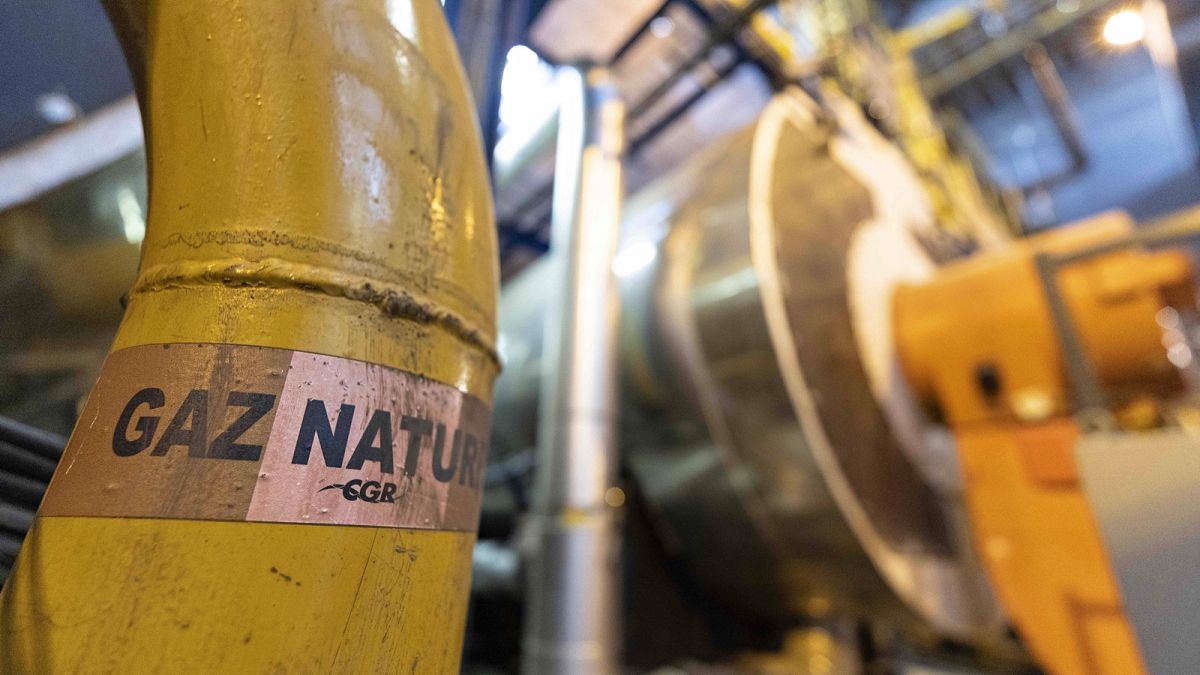Gas prices have fallen as the EU's gas storage facilities hit 90% of capacity.
Europe's gas prices have reached a three-month low, as demand from industry and households declines.
Prices at the Dutch Title Transfer Facility (TTF), Europe's leading trading hub, hovered on Monday around €150 per megawatt-hour, falling at times below that mark, to then settle at €154 at the end of the day.
The last time prices fell below the €150 threshold was in early July.
It comes as the European Commission announced the EU's gas storage facilities, which are essential for extra demand during winter, were at more than 90% capacity.
The relatively good news offers the bloc a much-needed respite in its fight to contain the energy crisis.
The latest prices represent a far cry from the €349 all-time record hit in late August, a month that raised the alarm across capitals and fuelled calls for an EU-wide cap on wholesale gas prices.
Prices, however, remain exceptionally high: a year ago, the TTF showed gas at €38 per megawatt-hour.
Expensive gas prices have a spill-over effect on Europe's entire energy sector.
As the most expensive fuel needed to meet all power demands, gas determines the final price of electricity. As gas prices soar, so do electricity bills for households and companies.
The EU is exploring different avenues, including targeted price caps and an alternative benchmark to the TTF, in order to lessen the influence of gas prices on electricity, but member states are still divided on what is the most suitable – and less risky– path to follow.
The downward trend in gas prices is set to guide the ongoing debate and could serve as an argument for member states, like Germany and the Netherlands, which have advocated for more cautious methods rather than forceful market intervention.
"Declining gas prices are due to storages being now almost full and by mild temperatures so far," Simone Tagliapietra, a senior fellow at the Bruegel think tank, told Euronews.
"Importantly, markets are seeing the demand decline, namely in the industrial sector."
Energy savings have become the centrepiece of the EU's response to the energy crisis. Savings are considered key to rebalancing the market's supply-demand mismatch.
Back in July, member states agreed on a first-ever coordinated plan to reduce gas consumption by 15% from August until March.
The plan was designed as a pre-emptive shield against Russia's manipulation of gas supplies, which stoked market speculation and drove prices to record highs.
The EU's suspicions proved correct when the Kremlin shut down the Nord Stream 1 pipeline in retaliation for Western sanctions.
A separate plan focused on mandatory power savings during peak times was approved in late September.
The industrial sector has already been forced to cut production hours and save costs due to the energy crisis.
Industrial production in the eurozone declined by 2.3% in July compared to the previous month, according to Eurostat. Consumer confidence is at its lowest level on record (-28.8% in the eurozone), falling harder than during the peak of the COVID-19 pandemic.
A non-paper drafted by the European Commission showed large gas savings in most EU countries, although some, like Ireland, Greece, Sweden and Spain, actually increased their consumption.
European Central Bank Christine Lagarde said last month the economic outlook was "darkening" and business activity would "slow substantially." Lagarde also predicted two consecutive quarters of economic contraction in winter, which would amount to a technical recession.
Analysts have said that, while a recession would be painful for Europeans, it would dampen demand and bring gas prices further down.
